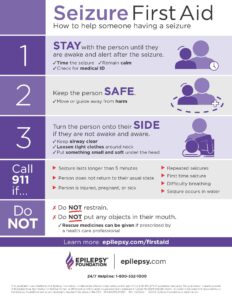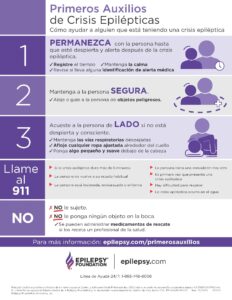Epilepsy is a brain disorder that causes people to have recurring seizures. The seizures happen when clusters of nerve cells, or neurons, in the brain send out the wrong signals. People may have strange sensations and emotions or behave strangely. They may have violent muscle spasms or lose consciousness.
Epilepsy has many possible causes, including illness, brain injury and abnormal brain development. In many cases, the cause is unknown.
Education Laws
- Federal law known as Individuals with Disabilities Education Act (IDEA) states that every child with a disability is entitled to a free, appropriate education in the least restrictive setting.
- Section 504 of the Rehabilitation Act of 1973 and the Americans with Disabilities Act (ADA) forbids discrimination against qualified students with disabilities by educational institutions including colleges and universities when a school receives federal funds
Seizure Care Plans
- If a student has been identified as having a seizure disorder the school nurse will complete an Emergency Care Plan.
- There is a medical alert symbol (white cross on a red medical bag) in eSD which identifies these students.
- If the student is on your enrollment you will be able to view the alert when you mouse on the symbol.
Absence & Complex Partial Seizures
- Absence Seizures may be hardly noticeable and lasts a few seconds. Sometimes the only clue is exhibited by rapid blinking or a few seconds of staring into “space”.
- Complex Partial Seizures present as confusion or being dazed and unable to respond to questions or directions for up to a few minutes.
General Tonic – Clonic seizures
- Sometimes called grand mal the person may cry out, lose consciousness, fall to the ground and have rigidity and muscle jerks lasting a few minutes. There is an extended period of confusion and fatigue afterwards.
- Seizures do not always indicate epilepsy. Temporary conditions such as high fever, low blood sugar, alcohol or drug withdrawal, or immediately following a brain concussion can cause seizures.
Rule # 1 in Emergencies
“Take a Deep Breath & Remain Calm”
Epilepsy Foundation: Seizure First Aid
 |  |
References
Important facts about Epilepsy/Seizure Disorder

